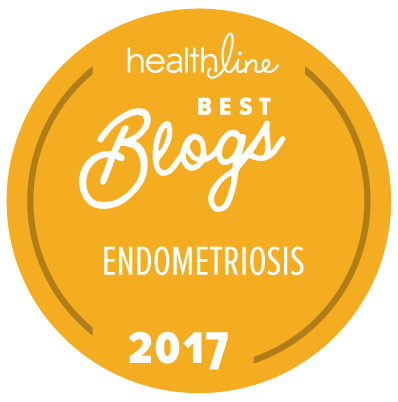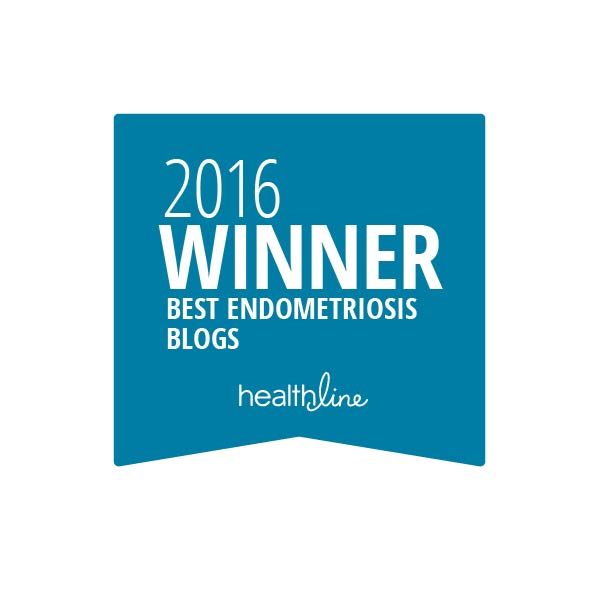If you clicked on this blog post, you probably already know that today is International Women's Day. But you may not be aware that March is Endometriosis Awareness Month.
I appreciate that the two intersect today. As I've reflected today on feminism and what it means to be a woman in 2017, my feelings about my incurable illness have also come up. To me, endometriosis bisects so many issues that women collectively face - those with and without endometriosis.
When I found out I had endometriosis in 2014, I didn't quite understand just how many layers of sexism and gender inequality were packed into my delayed diagnosis. I spent 13 years - from age 11 to age 24 - looking for answers to the searing, paralyzing pain that gripped me every single month, and then more frequently as my disease progressed. So when I finally received a label, I was too grateful to be angry or absorb the injustice of my situation.
For 13 years, I wasn't trusted as the authority on my own body. Doesn't that sound familiar?
How often do we question whether a woman is "really" in pain? Enough that I'm giving a talk on it next month.
How often do we argue if a woman was "really" assaulted? Enough that few people believed I faced domestic violence.
How often do we restrict reproductive health access, as though women can't be trusted to make the best decisions for themselves? Enough that I fear losing coverage for birth control and treatments to manage my endometriosis.
Even in 2017, much of our society feels a collective ownership over women's bodies. We insult women who wear outfits that are "too revealing." We criticize the single mother or the woman who elected not to be a mother without asking ourselves about the man who was involved. We ask women "Were you drunk?" or "What were you wearing?" or "Are you sure it wasn't a misunderstanding?" when they report a rape.
We demand so much from women's minds, souls and especially bodies. But when women's health issues come to the forefront - not just endometriosis - our society doesn't seem to have the time, money or resources.
Endometriosis impacts one in ten women worldwide. There are women who will go their whole lives without knowing they have it because they lack affordable, accessible reproductive health care. And even with the best health care, no woman will ever see their endometriosis cured. Because it's still incurable.
There is little funding out there for diseases like endometriosis. Once something is labeled a "women's issue," many people in power seem to turn away.
But if we're so worried about whether a woman is a mother, then why don't we tackle a disease that is a leading cause of infertility?
If we're so concerned about a woman's ability to nurture and care for others, then why don't we confront a disease that takes away precious hours, days, years from a woman's life, lost to pain and sickness?
We ask so much of women. And when they ask back, what do we offer in return?
"Maybe it's all in your head."
"You should try not thinking about it."
"Everyone has something. You think your disease is so special?"
"I think you're making it a bigger deal than it is."
"Get over it."
Despite all this, I find some comfort today when thinking about endometriosis. When I was diagnosed in 2014, I had never, ever heard of endometriosis. No one told me about it in health class. I never read about it in the news. It wasn't a word remotely in my vocabulary.
But in the past three years, I have seen more coverage of this disease than I have in my entire life. And it's because of brave women speaking out about their experiences and other women giving them a platform to share those stories.
While I'm uncertain if we'll see a cure or even a sophisticated treatment for endometriosis in my lifetime, I'm grateful for the hard work of women who have come before me and those who will follow. I'm eternally thankful that endometriosis is becoming more of a household word and that more young girls will grow up knowing about this illness and understanding its warning signs.
That's the difference between a delayed diagnosis (an average of 10 years for most women with endometriosis) and years without untreated pain.
If you're looking for a place to direct your support this International Women's Day, I encourage you to start with Endo What's School Nurse Initiative. This campaign will help ensure more young girls receive endometriosis education earlier and will learn to take charge of their health needs.
But if you can't give right now, I encourage you to keep sharing your stories and keep talking about endometriosis. This cause has already come so far because of people like you.
- 12:35 PM
- 98 Comments































